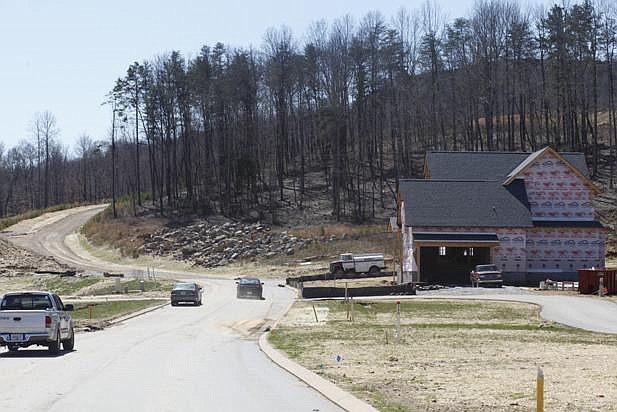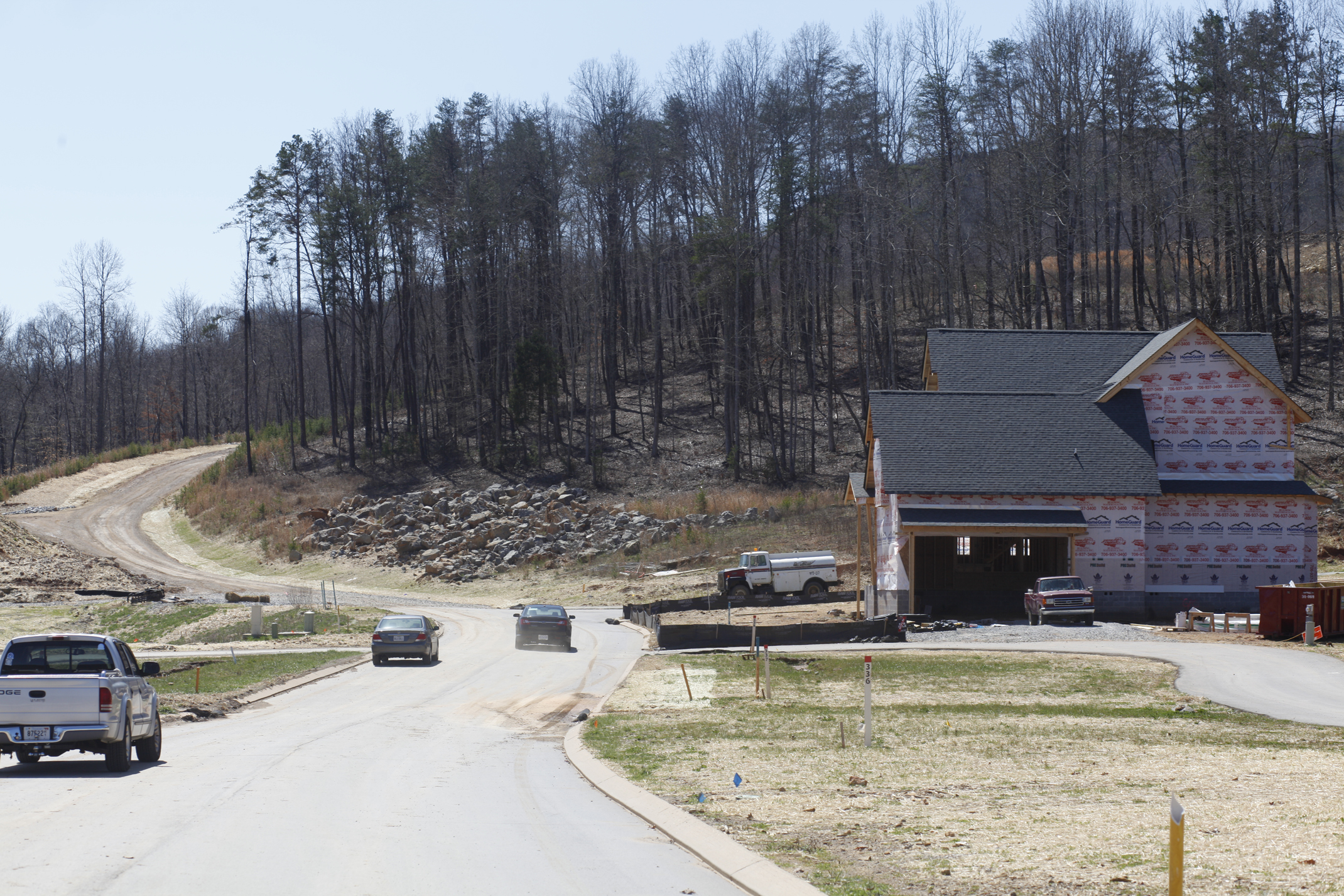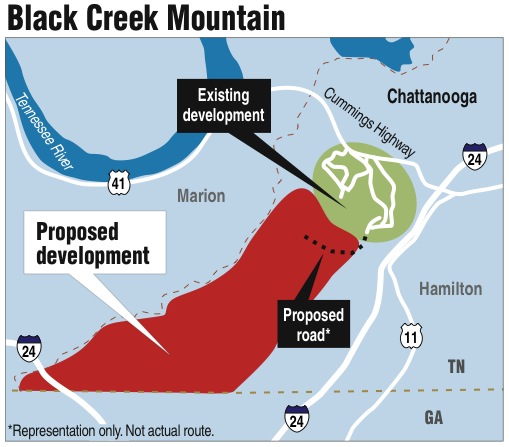Tax fight: $500 million taxpayer-assisted project shrouded in secrecy, lawsuit charges
Friday, January 1, 1904
The battle for Aetna Mountain has spilled into court amid a continuing clash over taxpayer financing for a $500 million private development, which would be the biggest neighborhood in Chattanooga.
Former planner and Chattanooga resident Helen Burns Sharp charged in a lawsuit that city officials approved more than $9 million in taxpayer support for a consortium led by a New York-based developer during secret meetings that could violate Tennessee's Sunshine Law.
"It sets a bad precedent for Chattanooga and gives ammunition to opponents of all tax incentives," said Sharp in a written statement.
The 24-page complaint, filed by Chattanooga attorney John Konvalinka in Chancery Court, names the city of Chattanooga, the city's Industrial Development Board and Hamilton County as defendants.
Government officials declined to address the case directly, citing pending litigation.
Sam Elliott, an outside attorney hired by the city to fight the suit, would only say that he planned to resist the charges.
Rheubin Taylor, the county attorney for Hamilton County, said he felt the county's involvement was "minimal."
"We don't think there's anything the county has done that has caused anybody any injuries," Taylor said.
Sharp claims that the increased taxes necessary to support the development for the next two decades will hurt taxpayers and retirees like herself.
rock, paper, lawsuit
The Industrial Development Board cited "attorney-client privilege" as its justification for withholding the documents that could explain its approval of $9 million in future taxes, which will go toward building a road through the controversial Black Creek Mountain Development, documents show.
"The IDB has willfully refused to disclose the public records requested by Sharp, even though the IDB knows or should have known that such records are public," Konvalinka wrote. "The IDB has withheld public records from Sharp, because such records would confirm the existence of nonpublic meetings of the IDB, including the secret IDB meetings, during which certain directors on the IDB met in secret with agents or representatives of the developer."
Tennessee's Sunshine Law prohibits governmental bodies from conducting secret votes, ballots or roll calls.
According to section 8-45-105 of the law, "Any action taken at a meeting in violation of this part shall be void and of no effect."
However, it would be difficult to stop the project, as road construction is already under way and workers are building more than a dozen homes nearby, a local broker said.
Mountain conflict
The luxurious Black Creek Mountain golf course community, formerly called Cummings Cove, has had its share of controversy. Even the name of the mountain is in dispute. Developers call it Black Creek Mountain. Most residents know it as Aetna Mountain. A nearby campsite calls itself Raccoon Mountain Caverns and Campground.
Tucked into the heart of what's known as one of the best off-roading sites in the Southeast U.S., the 1,200-acre project has changed names once and changed hands multiple times amid conflicts with its neighbors. A handful of mountain residents and a nearby business have claimed bullying by developers, and some have filed separate legal actions to stop what they see as encroachment on their way of life.
They see the taxpayer-financed road as a government boondoggle that duplicates an existing road that many use on a daily basis to climb the mountain. The neighborhood so far has been built along a public road that photos show developers have blocked or diverted on multiple occasions.
property destruction
For their part, developers have claimed that off-roaders have destroyed private property, parked on lawns in the suburban development and generated excessive noise. Pages of police reports confirm calls at all hours for issues primarily related to the off-roading community. The off-roaders are trespassing on both private and public property and hurting the mountain's environment, developers have said.
When it rains, mud from the barren off-road trails run into the Tennessee River, an environmental hazard that's frowned upon by state regulators.
The Tennessee Wildlife Resources Agency became embroiled in the conflict when it took steps to block four-wheelers from using the mountain's off-roading hotspots due to water runoff concerns, even as developers' bulldozers on the other side of the mountain scraped away vegetation to make room for new homes.
above the law
But Sharp's concerns pose a new threat to developers, who have claimed that the project is impossible without taxpayer help.
Sharp's goal in obtaining the records isn't purely informational. She seeks to totally overturn the decision to award $9 million in future taxes to developers for the construction of a road up the mountain, based on her assertion that the project doesn't qualify for taxpayer help.
"Typically, local governments approve tax increment financing for projects that either revitalize a blighted area or result in a significant number of permanent family wage jobs," Sharp said. "This project does neither."
Developers argue that the expense of building a road and running utilities up the mountain dwarfs the typical cost for neighborhood roads, and that the new road would open up an entire new community to further development. Ultimately, the project could create a city similar in size to Lookout Mountain or Signal Mountain, developers say.
The legal question is one of commercial facilities and jobs. To justify taxpayer help, a project must generate permanent jobs.
Developers have shown plans with commercial facilities at the top of the mountain, including a village center with retail and commercial space, an office park, restaurants an ice cream parlor and an assisted-living facility. Those jobs won't happen without a road to the peak, which they say will cost millions and would make the project unprofitable if they were forced to foot the bill themselves.
below the mountain
But so far, the project has been completely residential, aside from the golf course and clubhouse. The single commercial facility under way -- an assisted living center -- is being built at the bottom of the mountain and doesn't use the taxpayer-financed road, according to the complaint.
"All of these uses would be at the base of the mountain, and therefore do not need the $9 million TIF for access," Sharp said.
She hopes the court will nullify the decision to award $9 million to developers, based on what the complaint calls "unlawful and unauthorized actions taken by the IDB, the city of Chattanooga and Hamilton County."
"We will be subsidizing services to this development for up to 20 years," Sharp said. "Tax dollars that would otherwise be available to defray the general public's tax bill will be diverted to provide dollars to well-capitalized developers."
Chancellor W. Frank Brown is expected to examine the documents privately to determine whether they should be public, or fall under attorney-client privilege.
Contact staff writer Ellis Smith at esmith@timesfree press.com or 423-757-6315.


